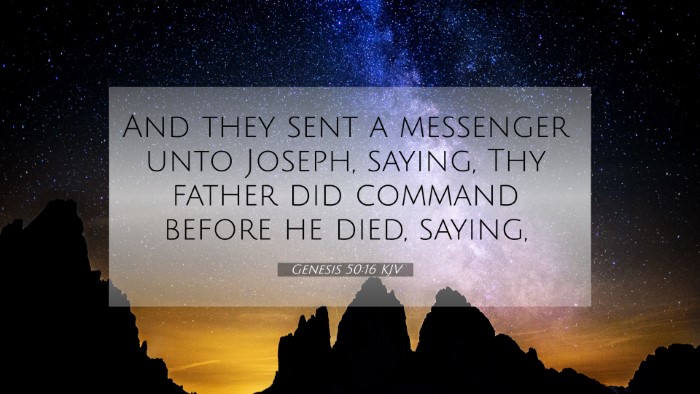Understanding Genesis 50:16
Genesis 50:16 states, “And they sent a messenger unto Joseph, saying, Thy father did command before he died, saying,
Summary of Genesis 50:16
This verse comes at a pivotal moment, following the death of Jacob, Joseph's father. Joseph's brothers, fearing his retribution for their past actions against him, send a messenger to Joseph with a fabricated message purportedly from their father. This illustrates their deep-seated guilt and the enduring need for reconciliation.
Insights from Public Domain Commentaries
Matthew Henry's Commentary
Matthew Henry points out the psychological tension in this narrative. The brothers' decision to send a message rather than approach Joseph directly reflects their apprehension and guilt. They might still harbor feelings that Joseph would seek vengeance for their earlier betrayal. Henry emphasizes that they are resorting to what they perceive as a father's authority to mediate their fears, highlighting themes of repentance and reconciliation.
Albert Barnes' Commentary
Albert Barnes notes the brothers' attempt to exploit their father's legacy to secure Joseph's forgiveness. Barnes describes the manipulation as a reflection of the brothers’ lack of faith in Joseph's character, which had undoubtedly changed since their past wrongdoing. This passage serves to illustrate human tendencies towards fear and distrust within familial relationships.
Adam Clarke's Commentary
Adam Clarke elaborates on the significance of their message. He posits that the brothers' act of sending a messenger rather than approaching Joseph themselves signals the persistent estrangement in their relationship. Clarke emphasizes that their attempt at faking their father's will points to an ingrained fear that must be addressed for true reconciliation to occur.
Thematic Bible Verse Connections
There are several important themes and connections to consider when interpreting Genesis 50:16:
- The nature of forgiveness: This verse highlights the complexities of forgiveness and the long-term effects of betrayal.
- Family dynamics: The interactions show how past grievances can linger and affect relationships.
- Authority and trust: The reliance on their father's authority to communicate fears indicates a deeper issue of trust among the brothers.
- Deception and truth: The use of deception by the brothers raises questions about honesty within family units.
Bible Verse Cross-References
Genesis 50:16 has several cross-references that deepen its meaning:
- Genesis 37:18-36: Joseph's brothers sell him into slavery, showcasing their betrayal.
- Genesis 45:4-15: Joseph reveals his identity to his brothers, emphasizing forgiveness.
- Matthew 6:14-15: Jesus teaches about the necessity of forgiveness.
- Romans 12:19: The call to not seek vengeance aligns with Joseph's eventual actions.
- Luke 6:37: Connection on the importance of not judging others and offering forgiveness.
- James 5:16: The significance of confessing and seeking reconciliation.
- Psalm 103:10-12: God's forgiveness reflects the pattern we must strive for in personal relationships.
Cross-Referencing Biblical Texts
This verse is rich for thematic cross-referencing and can be utilized in several Bible study methods. Here are some tools for Bible cross-referencing:
- Bible concordance: Use a concordance to find related themes and verses.
- Bible cross-reference guide: These guides assist in identifying connections between scriptures.
- Cross-reference Bible study: Engage in studies that explore the links between biblical narratives and themes.
- Identifying connections between Old and New Testament: Study how Old Testament narratives inform New Testament teachings.
- Bible reference resources: Utilize these for deeper insights into themes and contexts.
In Conclusion
Genesis 50:16 not only illustrates a critical moment of fear and potential reconciliation between Joseph and his brothers but serves as a launching point for broader discussions on forgiveness and the dynamics of familial relationships in the Bible. Through the commentaries of Matthew Henry, Albert Barnes, and Adam Clarke, we can draw significant insights that illuminate the depths of these themes.



